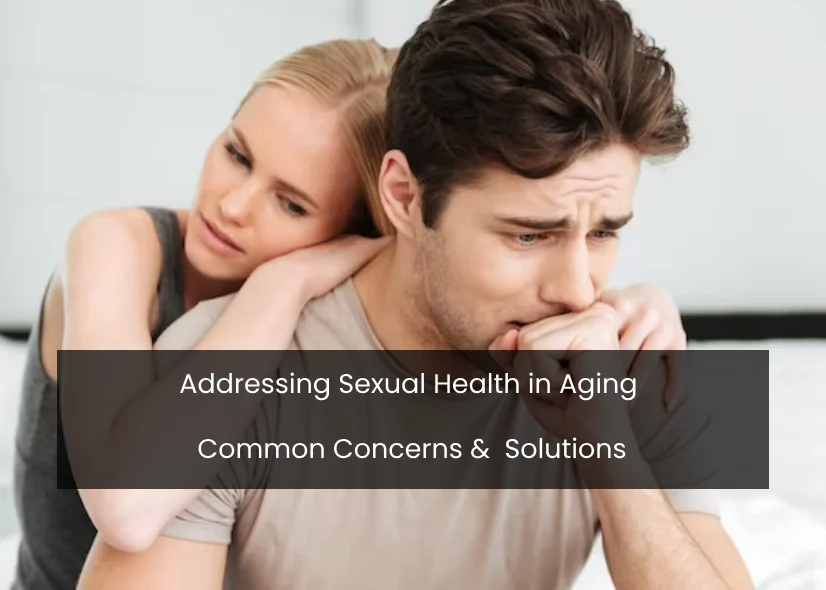Addressing Sexual Health in Aging Common Concerns and Solutions
As we gracefully age, various aspects of our health become focal points of concern. Among these, sexual health often takes a back seat, surrounded by misconceptions and societal taboos. However, addressing sexual health in aging is not just crucial for maintaining physical well-being but also for nurturing emotional connections and overall life satisfaction.
Common Concerns in Aging and Sexual Health:
As individuals age, various physiological and psychological changes can impact sexual health. It’s essential to recognize and address these concerns to promote a fulfilling and healthy sex life.
1. Physical Changes:
The aging process often brings about physical changes that can affect sexual function. Conditions such as arthritis, reduced flexibility, and hormonal shifts can impact sexual desire and performance
2. Medical Conditions:
Chronic illnesses, such as diabetes and cardiovascular diseases, are more prevalent in older adults and can contribute to sexual health issues. Medications used to manage these conditions may also have side effects that affect sexual function.
3. Hormonal Shifts:
Hormonal changes, particularly in menopause for women and andropause for men, can lead to alterations in sexual desire and response. Understanding these changes is essential for navigating this phase of life.
4. Emotional Factors:
The emotional state has a substantial impact on one’s sexual well-being. Issues like stress, anxiety, and depression, which can become more prevalent in aging, may impact libido and overall sexual satisfaction.
Solutions and Strategies:
While challenges may arise, there are numerous strategies and solutions that individuals and couples can explore to promote a healthy and satisfying sex life in their later years.
1. Open Communication:
The foundation of addressing sexual health concerns in aging lies in open communication. Couples should feel comfortable discussing their desires, concerns, and any physical or emotional changes they may be experiencing.
2. Education and Awareness:
Educating oneself about the changes that come with aging can demystify many concerns. Knowing what is normal and what may require medical attention is crucial for making informed decisions about sexual health.
3. Seeking Professional Guidance:
Consulting a healthcare professional or a sexologist can provide personalized advice and solutions tailored to individual needs. Professionals can address medical concerns, recommend appropriate treatments, and offer guidance on maintaining sexual health.
4. Prioritizing Physical Health:
Engaging in regular physical activity has been linked to improved sexual function. Exercise promotes overall well-being, helps manage chronic conditions, and enhances circulation – factors that contribute to a healthy sex life.
5. Intimacy Beyond Intercourse:
Expanding the definition of intimacy beyond traditional sexual intercourse is essential. Emotional closeness, affectionate touch, and shared experiences contribute significantly to a fulfilling connection.
6. Exploring Sensual Activities:
Experimenting with sensual activities and trying new things in the bedroom can reignite the spark in a long-term relationship. Being open to exploration and embracing change can lead to increased intimacy.
7. Use of Lubricants and Devices:
For individuals experiencing changes in sexual function due to aging, the use of lubricants and devices can enhance comfort and pleasure. Open communication about preferences and needs is crucial when introducing such aids.
Breaking Taboos and Shifting Perspectives:
Addressing sexual health in aging requires a societal shift in perspective. Breaking through taboos and stereotypes associated with older adults and sexuality is essential for fostering a more open and supportive environment.
1. Challenging Ageism:
Ageism perpetuates stereotypes that older adults are no longer interested in or capable of enjoying a satisfying sex life. Challenging these stereotypes and recognizing the diversity of experiences is a crucial step.
2. Promoting Inclusive Education:
Comprehensive sexual education programs should be inclusive of all age groups. Normalizing discussions about sexual health in aging can empower individuals to seek help and make informed decisions.
3. Encouraging Positive Media Representations
The media plays a crucial role in influencing how society perceives things. Encouraging positive and realistic portrayals of intimate relationships in older adults can contribute to changing cultural attitudes.
In conclusion, addressing sexual health in aging requires a holistic approach that combines open communication, education, and a shift in societal attitudes. By recognizing and addressing common concerns and embracing solutions, individuals and couples can continue to enjoy a healthy and satisfying sex life well into their later years. Breaking through taboos and fostering a culture of acceptance is crucial for ensuring that aging is accompanied by a positive and fulfilling sexual experience.

